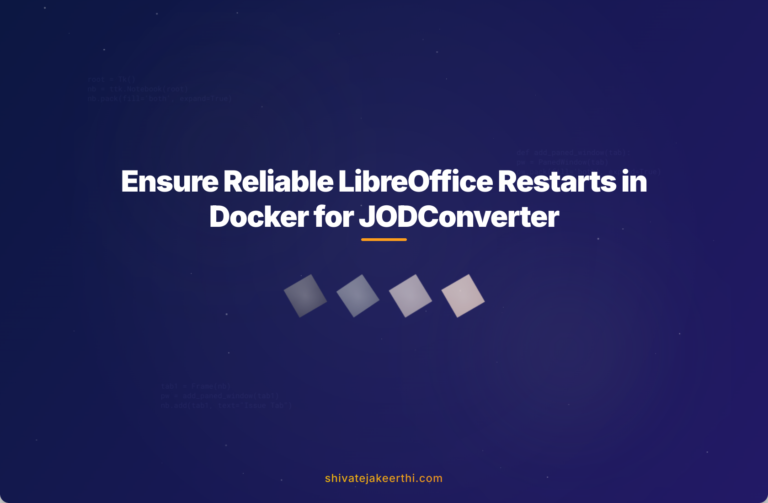Many developers deploying Java applications with JODConverter to Docker containers experience unexpected issues after hours of successful running. A common problem is the failure of JODConverter to restart LibreOffice, causing headaches and disrupted workflows.
The issue often surfaces as intermittent document conversion failures after a prolonged uptime. Let’s look into the setup behind this scenario, the troubleshooting processes involved, and the steps you can take to effectively resolve and prevent this common Docker headache.
Understanding the Problem
Typically, Java applications leveraging JODConverter paired with LibreOffice are great for converting office documents to PDFs efficiently. Running these conversions inside Docker containers is an even smarter choice, as it provides isolation, consistency, and portability across environments.
Imagine having a Docker image based on an OpenJDK environment paired with LibreOffice. Your Java application communicates flawlessly with LibreOffice via JODConverter initially, seamlessly handling document conversions without any issues. However, after running smoothly for several hours or even days, suddenly conversions fail.
From reviewing different scenarios and forum discussions on platforms such as Stack Overflow, this tends to happen intermittently. Initially everything runs smoothly. You deploy the application into Docker, everything operates normally, until suddenly after continuous operation, JODConverter fails to restart LibreOffice.
A typical event sequence looks like this:
- Application successfully converts documents at first.
- After running for several hours, conversions start failing occasionally before eventually stopping completely.
- Attempting to restart the LibreOffice process from Java doesn’t resolve the problem, leading to consistent failures thereafter.
Troubleshooting the Underlying Issue
After digging through relevant logs, developers commonly find errors similar to:
org.jodconverter.core.office.OfficeException: Could not establish connection
caused by: org.apache.commons.lang3.ObjectUtils$DisposedException: Object already disposed.
Paired often with ‘Connection Timed Out’ error logs, these entries identify precisely why restarting LibreOffice doesn’t resolve the situation.
Upon further inspection through various log analyses, developers often see warnings indicating threads or processes become stuck or are unavailable, leading to resource exhaustion over time.
Restarting the Docker container typically provides temporary relief by resetting the environment. But that’s hardly a sustainable long-term solution. The underlying causes still remain unsolved if not fully investigated.
Normally, restarting LibreOffice from within the Java application using JODConverter’s built-in restart mechanisms should work. However, in long-running scenarios, JODConverter might fail to handle reinitialization properly, making manual or external interventions necessary.
Why Does This Actually Happen?
The most common root cause comes from LibreOffice or its interaction through UNO interfaces (used internally by JODConverter) reaching exhaustion or hitting unexpected scenarios after continuous uptime.
The DisposedException indicates that JODConverter tries to reuse already disposed objects to interact with LibreOffice. This happens often when LibreOffice itself has crashed, hung, or reached memory limitations: resources leak slowly over time, eventually causing a complete breakdown.
Simultaneously, the connection timed out errors occur because LibreOffice instances refuse incoming connections or simply aren’t alive anymore, leaving JODConverter helpless about cleaning up or restarting gracefully.
Practical Solutions and Workarounds
Luckily, several approaches help mitigate or entirely fix this recurring problem. The most common and practical ones involve Docker configuration tweaks and robust code modifications.
1. Docker Configuration Improvements
Running LibreOffice within Docker can be resource-intensive, especially if your container config isn’t optimized. Here are some quick Docker improvements developers find helpful:
- Increase memory resources: Docker’s default resource limits may be insufficient for LibreOffice-heavy workloads. Adjust Docker’s memory settings with the following parameter:
docker run -m 2g mylibreoffice-container
- Regular container restarts: Scheduled restarts of containers can help prevent memory buildup and refresh resource allocations. An effective example can be using Docker Compose:
restart: unless-stopped
2. Enhancing Code for Process Restarts
Rewriting the restart logic within your application code often brings the best improvements. Consider explicitly catching and handling exceptions, ensuring robust attempts at process recovery:
- Add robust exception handling: For instance, explicitly catch DisposedException and recreate the OfficeManager instance when it occurs:
try {
// your conversion logic here
} catch (DisposedException e) {
officeManager.restart();
// Retry your conversion logic
}
- Explicit timeout enforcement: Configure timeouts explicitly in JODConverter to ensure problematic threads are terminated:
officeManager = LocalOfficeManager.builder()
.taskExecutionTimeout(60000L) //timeout setting
.build();
Doing this proactively handles stuck processes in advance, rather than waiting until the system disruption occurs.
Best Practices for Keeping Long-Running Processes Stable
In addition to the above fixes, adopting proactive strategies boosts stability:
- Implement timeout mechanisms: Always enforce clear execution timeouts on conversion tasks. This prevents long-running or stuck processes from hogging system resources indefinitely.
- Use monitoring and alerts: Implement tools like Prometheus and Grafana for Docker container monitoring. Set up real-time alerts to notify you immediately of resource exhaustion or unexpected crashes, enabling prompt resolution before major disruptions occur.
Optimizing Performance and Future-Proofing Your App
Optimizing your Docker setup ensures better stability and prevents similar issues. Here are practical performance tips:
- Use Docker’s official OpenJDK images fine-tuned for your application workloads.
- Optimize JVM memory allocation based on your actual workload patterns. Consider using flagged JVM options like -XX:+UseG1GC for better garbage collection management.
- Regularly monitor LibreOffice and JODConverter updates as newer versions address bugs responsible for resource exhaustion.
Future-proofing your Dockerized Java apps also entails regularly refreshing your containers to managed baseline states using container orchestration platforms like Kubernetes to schedule automated restarts or using infrastructure-as-code tools like Terraform to maintain consistent, tested runtime environments.
Always remain proactive, continuously adjusting resources, configurations, and monitoring practices to anticipate rather than merely react to similar situations.
Having prepared, optimized, and maintained your Docker environment properly, you won’t just solve the JODConverter and LibreOffice restarts issue, you’ll create a more reliable and stable production application environment.
How do you handle similar long-running resource-intensive processes within your Docker environments? What other tactics or ideas have you successfully implemented? Share your thoughts and solutions below!



0 Comments